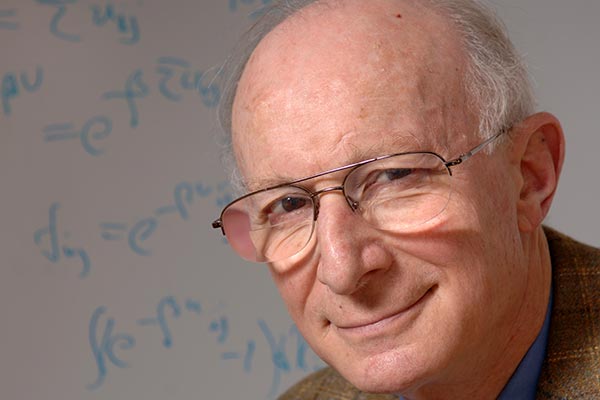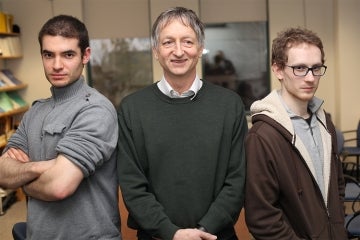
Honorary graduate Stuart Rice
Published: June 4, 2013
As the Frank P. Hixon Distinguished Service Professor Emeritus at the University of Chicago, Stuart Rice has been a key contributor in the realm of physical chemistry.
For his important contributions and advancement of knowledge, he received the National Medal of Science in 1999.
The latest of Rice’s impressive list of accomplishments is an honorary degree bestowed on him from the University of Toronto June 5, 2013. (Watch the ceremony: http://uoft.unikron.com/)
Writer Gavin Au-Yeung spoke with Rice about the importance of academia and the role of the graduate.
What advice would you give to a graduating student?
Rather than giving them advice as to how they can develop, I would challenge graduates. In earning a degree, students have had support from a lot of different sources – friends, teachers, family, and the university. By leaning on these supports, the graduate is put under an obligation to support others in the future.
The other obligation graduates have is to promote intellectual value that is, the notion that ideas are important. There is an evolving advocacy trying to change the character of universities, and to make them “relevant” and corporate oriented. I think this advocacy needs to be resisted, as it would destroy the notion that knowledge is a fundamental value to society. People who are educated and have grown up in the university environment have an obligation to preserve aspects of intellectual freedom and to ensure those resources they’ve relied on are still available in the future.
What is the true value of a post-secondary degree?
I truly believe it is for the sake of preserving and advancing knowledge for the sake of knowledge, for the disciplines I’m talking about. However, that’s only for the arts and sciences, as I understand them. The value is that, loosely speaking, ideas matter. That’s what the graduates have been working with, and that’s what I hope that they will carry forward.
What has been the key to your success?
I’ve been in a good environment in which I’ve been allowed to do things my own way and not be pressured by external fads. There’s a lot of mixing of disciplines and support of the mixing and serendipitous encounters at the University of Chicago. So a lot of what I’ve done over the years has resulted because of having friends in physics or other departments who are doing other things, learning what’s going on and being able to get different ideas based on cross-fertilization. I think it’s really been the environment and the quality of students I’ve worked with consequently.
What were your initial reactions when you heard about the honorary degree?
I was delighted, elated, and just felt very good. I received an email from President Naylor, which was then followed up by a hard copy letter.
Personally, what is your proudest achievement?
That’s a complicated question to answer. At the people-to-people level I’m proud of the way my former students and postdoctoral have prospered. And at the research level, I’m proud of the work on active control of chemical reactions.
What do you think more people should know about the University of Toronto
I’m aware of Toronto being one of the most distinguished universities in Canada. In my fields – physics and chemistry – Toronto has been a prominent place for quite a long time. When I was growing up, in the United States, McGill was thought to be the dominant Canadian university (and Montréal the metropolitan centre). With the Quebec separatist movement, Toronto succeeded Montréal as the dominant port of entry and intellectual centre for Canada. The city itself has also changed, as it has become more vibrant. I’ve known about Toronto for quite a long time and I have a great deal of respect for the university and for what the people are and have done.
Biography
Stuart Rice is the Frank P. Hixon Distinguished Service Professor, Emeritus, in the Department of Chemistry and The James Franck Institute at The University of Chicago. Born in New York City, Professor Rice received a BS degree from Brooklyn College in 1952 and AM and PhD degrees from Harvard University in, respectively, 1954 and 1955. He was elected to the Society of Fellows, Harvard University, in 1955. After two years as a Junior Fellow he joined the faculty of The University of Chicago, where he has remained. He was selected to be the Frank P. Hixon Distinguished Service Professor in 1977.
Professor Rice has carried out theoretical and experimental research in diverse areas of physical chemistry. He and his coworkers have published 700+ papers dealing with polyelectrolyte solutions, helix-coil transitions in polypeptides and DNA, the transport of mass, energy and charge in liquids, diffusion in crystals, the equilibrium properties of dense fluids, the fluid-solid transition, exciton-exciton interactions in molecular crystals and polymers, exciton and charge carrier band structures of molecular crystals and liquids, structure of the liquid metal-vapor interface, pseudopotential theory of atomic and molecular electronic structure, radiationless transitions, non-statistical behavior in unimolecular reactions, structure and properties of water, quantum and classical deterministic chaos, collision induced mode specific state-to-state vibrational energy transfer, shaped laser field active control of molecular dynamics, structure of Langmuir monolayers, structure, phase transitions and diffusive motion in quasi-one and quasi-two-dimensional colloid assemblies, and miscellaneous other subjects.
He has also coauthored four books: Polyelectrolyte Solutions with Mitsuru Nagasawa, The Statistical Mechanics of Simple Liquids, with Peter Gray, Optical Control of Molecular Dynamics, with Meishan Zhao, and Physical Chemistry, with R. Steven Berry and John Ross.
Among other public service activities, he has served on numerous advisory boards for Federal Agencies, was a member of the National Science Board from 1980-1986, a member of the Board of Governors of Argonne National Laboratory for 12 years, and a member of the Board of Directors of the Bulletin of the Atomic Scientists for about twenty years.
Rice is a Fellow of the National Academy of Sciences, the American Philosophical Society and the American Academy of Arts and Sciences, and a Foreign Fellow of the Royal Danish Academy of Sciences and the Royal Irish Academy of Arts and Sciences. He has received four medals from the American Chemical Society (the Award in Pure Chemistry, the Baekland Award, the Debye Award, and the Hildebrand Award), as well as the Hirschfelder Prize in Theoretical Chemistry, the Centennial Medal of Harvard University, the National Medal of Science and the Wolf Prize in Chemistry.



